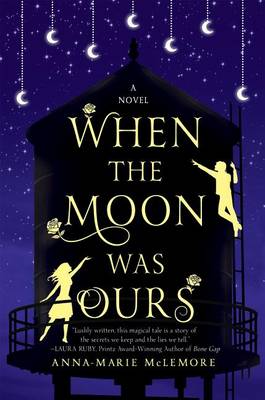
Jo
Written on Feb 15, 2017
Having loved The Weight of Feathers, there was no way I wouldn't be reading Anna-Marie McLemore's second novel, When the Moon Was Ours. More of her gorgeous writing, more magic realism - and featuring a trans boy as one of the protagonists? How could I say no to that? I was blown away by the beauty in these pages.
It's hard to know what to say about this book. What I will say will lead to questions, but questions that can't be answered without spoiling the story. It's about Miel, a girl who came out of the water tower, whose wrist roses grow from. It's about a boy, Sam, who paints moons and hangs them from trees, moons he says things with, when he can't find the words. It's about the love that grows between these two outsiders. It's about how four beautiful redheaded sisters, who are believed to be witches, will do anything to get Miel's roses - the roses they believe will give them back their power. It's about grief, and identity, and love - all kinds of love. And it's completely beautiful. It's also a reimagining of La Llorona, of Latin American folklore.
The thing I love most about magical realism is how it leads to the complete suspension of disbelief. There are so many things that aren't explained to you, things that you just have to accept - like roses growing from a girl's wrist. And this is just one of many things in When the Moon Was Ours that we don't get an explanation for. The only reason I am able to accept and not wonder is because McLemore writes so artfully. There is a fairy tale feel to magical realism, a style of storytelling that enchants, a spell the words weave that leads to acceptance. It's this that I felt was missing from Bone Gap by Laura Ruby, the element that allows - or rather, encourages - suspension of disbelief. With too many questions and not enough answers, you can find yourself frustrated. It's in the telling of the story that allows your imagination to float off with it, and be taken wherever it leads, gladly. And it's because of this I don't really want to talk much about the plot. I've told you enough, I believe, and the rest you should discover yourself as you, too, are caught up in Miel and Sam's story.
But I do want to discuss the diversity in this book. Miel is Latina - making this an #OwnVoices novel - and Sam is Italian-Pakistani. Sam is also transgender. We learn about bacha posh, a tradition in some Pakistani families who have no sons, where one daughter, for all intents and purposes, "becomes" a son so there is someone to look after his sisters and mother - in a culture where men have more standing and freedom than women - until the time when the son is to become daughter again and be married. This is the lie Sam has been living, that one day he will be grown enough, and will want to be his mother's daughter again. His struggle with his identity is heartbreaking, but in the end, beautiful. There's no magical realism when it comes to Sam's gender identity or how he expresses it. But there's something about this particular story - whether it's that there's a lot of magical realism, or in how the story is told, it being so enchanting - that led to deeper understanding of transgenderism, of gender identity. It's because of how Sam sees himself in the end, as a person, and how he sees his body, but also in how Miel sees him, and how she sees his body. When the Moon Was Ours is the first book I've read to feature a trans person having sex, and not only because of that is it important, but also because of the two people, Miel and Sam, and how they both see Sam the person and his body. It's hard to explain, but this was such a beautiful story of acceptance of self in so many ways. To both Sam and Miel, Sam's body is his body, and his body is a male body, because he is male - no matter his physical form. I can't explain it any better than that. Just read this book. Please, just read it.
This is another gorgeous, beautiful, bewitching and hopeful, uplifting story from McLemore, and has firmly secured her place as one of my favourite authors. When the Moon Was Ours is a triumph, and it's beauty brought tears to my eyes.




